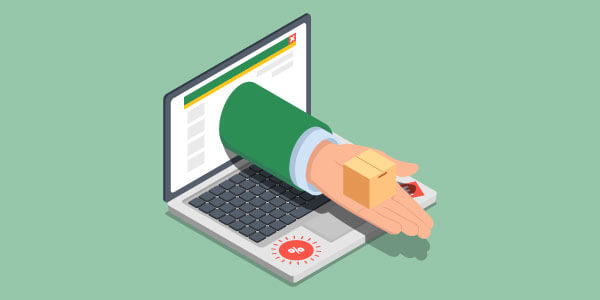
Selling online is tricky. You might have the most amazing products out there. But with new e-commerce sites cropping up all the time, competition between online retailers is consistently fierce.
Whether you're new to the scene or have been trading for a while, there's a good chance at some point you'll find it harder to get noticed. What then?
There's no easy answer here, but one thing's fairly clear: the mistakes you make when selling online can easily turn into bad habits that cost you your sales.
That's no reason to be discouraged, though. There's always room for improvement and it's never too late to take stock of what's holding you back – and what'll help you grow.
With that in mind, here are some of the most common mistakes you can make when selling online:
5 mistakes you can make when selling online
1. Not getting inside your customer's head
It's easy to get carried away with a bright idea and launch your online shop before you're ready. But understanding who you're selling to (as opposed to just what you're selling) should be at the heart of what you do. It's likely to influence many of your decisions further down the line.
Rather than leap straight into selling online, make it your mission to know your target audience inside out. Find out where they hang out online, see what trends they're following, what topics they're talking about, what products get them excited – in short, what makes them tick.
While you're at it, research your competitors too. What special services, products, or promotions do they offer? Now use that knowledge to think about how you'll cater to your customers. What can you do that your competitors don't?
2. Specialising in only one platform
Mobiles, tablets, desktops, laptops...today's online shoppers browse the web in more ways than one. So you need to make sure of two things: that your customers can find you across a range of devices and that their browsing experience (everything from the look and feel of the website to the payment process) is the same across all of them.
If it helps, use an off-the-shelf system like Shopify or WooCommerce. They're quick to set up, easy to use and allow you to manage your inventory across multiple sales channels using a nifty range of apps and widgets. Perfect if website development isn't your thing.
You'll still need to protect yourself (and your client's data) from hackers, viruses, and fraudsters, though. Having cyber insurance is a good idea, as is downloading anti-virus/anti-spyware software, and using PayPal to process payments.
For more information on preventing cybercrime, check out the government's cybersecurity advice for small businesses.
3. Marketing yourself too broadly
When it comes to marketing for online retailers, it's tempting to assume that more is, well, more.
Easy access to a vast number of online tools also means that even the most die-hard of technophobes can quickly become a marketing whizz.
Google Analytics for website traffic, Moz for SEO, HootSuite for social media and MailChimp for email marketing, to name just a few.
But unless you're monitoring your results and finding out where you're generating worthwhile leads, you could be wasting your time and money. Rather than throwing yourself into too many tasks, dedicate a good slice of your time towards testing and trying out new things.
If sales don't pick up straight away, be patient. Increased traffic doesn't automatically equal more sales, so keep optimising your site and fine-tuning your strategies. Persistence makes perfect and you'll soon be in a position to see some good returns.
4. Neglecting your customer service
E-retailers all agree that one of the biggest challenges of selling online is turning first-time buyers into repeat customers. While there's no easy fix, building up a good rep for customer service can definitely help.
It goes without saying you should dispatch orders on time, check your stock regularly, and make sure you respond quickly to all complaints and enquiries. Customers don't like to be kept waiting and will rather shop elsewhere than wait for a response.
Once you've built up a track record of meeting your customers' expectations, see if you can exceed them too. Sending out courtesy emails, jazzing up your packaging, and throwing in the odd voucher or free sample are just some of the ways to do this.
Consumer safety should be every online retailer's first priority and the government has plenty of rules on online and distance selling to get your head round. If you need more help, Which.co.uk's guide to consumer contract regulations clearly explains consumer rights and what you should include in your returns policy.
5. Not coping with unprecedented delays and disruptions
Running an online shop surely means you're master of your own destiny, right? Well, no, not always.
Seems pretty obvious that any major delays to your service means customers will be less likely to buy from you again in the future. But the fault doesn't always have to lie with you.
Sometimes it takes something as unexpected and beyond your control as theft, winter weather, or a postal strike to throw a major spanner in your works. A fire or flood wipes out your stock and equipment, for example. Or a utilities failure stops you from getting online...
Security when selling online
Clearly, there's lots to think about when you're selling products online. And while online retailers' insurance can't mitigate all the odds of something going wrong, it will throw you a lifeline in many cases.
If that's something you're sold on, you can browse our online retailers' insurance guide for more info. Or just call us on 0345 222 5391. We're happy to answer any questions.
Image used under license from Shutterstock.
cyber liability insuranceonline retailersrules and regulationsrunning a business
